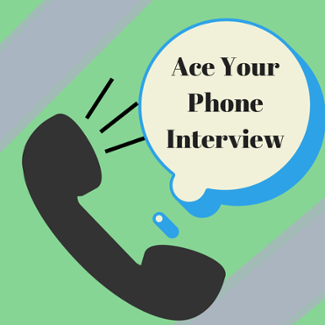 It is pretty much a given these days that if a candidate’s resume makes it past the first step in the screening process, the next step will be a phone interview. In today’s job market, human resources, hiring managers and recruiters are using the phone to conduct in-depth interviews that rival the in-person format. Recruiters and hiring managers receive hundreds - if not thousands - of applications and responses to job postings. The practice of a phone screen allows them to process multiple candidates, saving both time and recruiting expenses.
It is pretty much a given these days that if a candidate’s resume makes it past the first step in the screening process, the next step will be a phone interview. In today’s job market, human resources, hiring managers and recruiters are using the phone to conduct in-depth interviews that rival the in-person format. Recruiters and hiring managers receive hundreds - if not thousands - of applications and responses to job postings. The practice of a phone screen allows them to process multiple candidates, saving both time and recruiting expenses.
A survey conducted by OfficeTeam, a staffing agency based in Menlo Park, Calif., polled 515 human resources managers, the majority (57%) of whom reported that phone interviews happen “very often.” Even with Skype and video interviews on the uprise, the phone interview is still a common practice.
So what is the best advice for acing the phone interview?
- Job seekers should prepare for a phone interview as serious as they do for an in-person interview. Phone interviews can be as short as 20 minutes or in depth and last for an hour or longer. Be prepared to answer the "tell me about yourself" question, provide answers to difficult questions, share success stories, and ask specific questions of the interviewer.
- Planning the environment and atmosphere for the call is critical. If you receive an unexpected call from a recruiter or hiring manager, thank them for their interest, and try to reschedule the call to give yourself the opportunity to prepare and create the right environment. The environment should be free of distractions: no barking dog, TV or loud music, or repairman in the house. Dress to feel the part. Sit at a desk or quiet place with a copy of the job description, your resume, paper and a pen.
- Smile, be pleasant and show enthusiasm and your personality. It’s all about the voice during a phone interview, so monitor your voice tone, speak slowly and don’t rush. Pause and allow the interviewer to ask questions.
- Since you can’t observe the interviewers body language, keep your responses short and don’t over talk. Listen closely. Ask the interviewer if they need further clarification or details in response to a question. It’s a good practice to ask at the beginning of the interview how much time they have so you can plan to make your major points.
- Ask for the interviewer's name and contact information at the beginning of the call in case you get disconnected or interrupted. This will also allow you to follow up after the call.
- At the end of the call, thank the interviewer and ask to meet in person. Inquire about next steps and time frame to fill the position.
- Follow up within 24 hours after the call. Email a thank you message referring to points from the interview and outlining specific ways you can add value to the organization. One of the common mistakes made by job seekers is to not plan a thorough follow up strategy. Job seekers often assume if they don’t hear back immediately from the hiring manager or recruiter, that they are out of the running. Truth is hiring managers and recruiters are busy people. A reminder done in a positive way could be the key to moving the process forward, and it will demonstrate the job seeker’s true interest in the position.
Paula Pope is a Senior Consultant with The Frontier Group. Her practice specialties are career coaching, outplacement and executive development.
![]()



